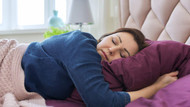Menopause can impact your sleep significantly, with the symptoms of menopause beginning around four to seven years before a person’s last period.
This is due to the hormonal changes that come with menopause, which can lead to people having issues with their sleep, waking up during the night, and feeling hot and sweaty and tired throughout the day.
Up to 46% 1 of individuals have issues with their sleep in the years leading up to menopause. We explore how menopause impacts your sleep and the connection it can have to sleep apnoea.
What are some sleep problems that are associated with menopause?
Night sweats and hot flashes
Menopausal people may experience hot flashes, which are the most common causes of night sweats. Hot flashes may only last a few minutes but can happen several times throughout the day.
Research has also shown that some women can suffer from hot flashes for 20 years and that women usually wake just before experiencing a hot flash1.
When you wake up during a hot flash, it can cause discomfort and agitation and can make it difficult to fall back asleep.
“There are changes in the brain that lead to the hot flash itself, and those changes — not just the feeling of heat — may also be what triggers the awakening,” Grace Pien, M.D, M.S.C.E explained to John Hopkins.
“Even women who don’t report sleep disturbances from hot flashes often say that they just have more trouble sleeping than they did before menopause. 2”
Snoring and obstructive sleep apnoea
During the menopausal transition and after menopause, snoring can become increasingly common for women. This is due to a decline in reproductive hormones, which can cause the soft tissue in the throat to become more collapsible.
Some women also gain weight during menopause, which can cause obstructions in the airway while sleeping, which also results in snoring.
The decline in reproductive hormones like estrogen and progesterone can also cause sleep apnoea, which is common while experiencing menopause.
Unfortunately, it can go undiagnosed as women attribute some symptoms of sleep apnoea (like daytime fatigue and snoring) to menopause itself.
“Postmenopausal women are two to three times more likely to have sleep apnoea compared with premenopausal women,” Pien says to Hopkins Medicine.
“Before we become menopausal, we're fairly protected, but the protective effect of hormones seems to be lost with menopause. Furthermore, women often have more subtle symptoms of sleep apnoea than men.
“Thus, they may be less likely to seek evaluation for sleep apnoea. Their health care providers may also be less likely to recognise sleep apnoea as a possibility, further delaying evaluation and diagnosis of sleep apnoea.”
How can I get a better night’s sleep while going through menopause?
The good thing is there are ways that you can get a better night’s sleep while experiencing menopause. Some ways include 1:
- Getting more exercise or exercising regularly
- Optimising your sleep environment by making sure it’s cool, dark and quiet
- Managing your stress through meditation or journaling
If you’re not getting the sleep you know you deserve, you can book a sleep apnoea test at particpating Blooms The Chemist pharmacies across the country.
Our friendly team would be more than happy to help you get the treatment you need for sleep apnoea and begin your journey to better sleep. We hope to see you soon.
References
1Sleep Foundation, How can menopause affect sleep, accessed 1 February 2024
2John Hopkins Medicine, How Does Menopause Affect My Sleep?, accessed 1 February 2024

